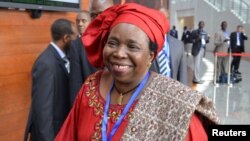Addis Ababa — South African Home Affairs Minister Nkosozana Dlamini-Zuma was sworn in Tuesday as the new chairperson of the African Union Commission. The leadership handover at the African Union takes place as the organization tackles security crises across the continent.
Dlamini-Zuma took the oath of office shortly after midnight, at the close of the AU summit in Addis Ababa.
The former wife of South African President Jacob Zuma was elected in a fourth round ballot on Sunday, defeating incumbent Chairman Jean Ping of Gabon.
Ping congratulated Dlamini-Zuma on being first woman to hold the office. "This is a memorable moment,” Ping said, as he wished Dlamini-Zuma the very best success in undertaking this “noble mission.”
Ping and Dlamini-Zuma had run for the office at the previous summit in January, but member states were divided along geographic and linguistic lines, leaving neither candidate with enough votes for an outright win, leading to several ballots at this summit.
Speaking to reporters on Monday, Dlamini-Zuma said her election should not be seen as a personal victory, and she pledged to work to unify the organization. “My view is that I'm an African citizen. I am loyal to the African Union, and I will serve the African Union, and I'll work collectively with every member state," she said.
The summit also provided a venue for African leaders to address regional crises.
The presidents of Rwanda and the Democratic Republic of Congo signed an agreement on Saturday to support, in principle, the formation an international force to confront an armed rebellion in the eastern part of the DRC.
The meeting between Congolese President Joseph Kabila and Rwandan President Paul Kagame followed the release of a U.N. report charging Rwanda with supporting the rebels in the DRC.
AU Peace and Security Commissioner Ramtane Lamamra, who also won reelection, cautiously welcomed the agreement.
“Both at the level of ministers and heads of state, there is a new spirt. There is an equal eagerness to work together to overcome the misunderstandings that may exist on the ground. And I believe that the only thing that we can request of you is give us a chance to work and develop a new spirit, and translate it into deeds on the ground," he said.
Negotiators from Sudan and South Sudan also have been meeting in Addis Ababa and in the northwestern town of Bahir Dahr since Thursday, restarting talks aimed at settling disputes leftover from South Sudan's independence from Sudan last year.
The Peace and Security Council also reaffirmed its support for West African plans for a possible military intervention in northern Mali, where Islamist militants have seized control of several towns in the wake of a political rebellion.
Casting a shadow over the summit was the absence of Ethiopian Prime Minister Meles Zenawi, causing speculation he is in poor health. A senior Ethiopian official confirmed to Bloomberg news that Mr. Meles is ill, but said it was not serious.




